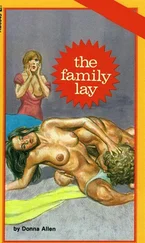“No. I heard Ellen from the garden,” says Anne calmly, but her skin has changed. Like a snake. Her face is dark and mottled. I’ve riled her.
“George wasn’t here, I swear,” Ellen tries again. “What you heard—yes, I said ‘George’s Visit,’ but I wasn’t talking about George coming here. He’s never been to this house, honestly.”
“Do you think I’m an idiot?” Anne asks her.
“No, listen. Dad’s a singer. I’ve grown up listening to a lot of opera, and my favorite’s Carmen , by Georges Bizet. When I was a child, before I’d learned any French, I saw his name on a CD case and pronounced it wrong. Mum and Dad thought I’d said ‘George’s Visit,’ and it stuck. We’ve all called Bizet ‘George’s Visit’ ever since. Haven’t we, Mum? It’s become like . . . a family joke.”
A game for all the family!
Ellen’s not looking at me, but a little to my left. I turn to see what might have caught her eye.
The noticeboard. Alex’s list. “CAR MEN!!” at the top. Bizet’s Carmen. So that’s what gave her the idea.
“It’s true,” I lie. “That must be what you heard, Anne.” Is this what Stephen Donbavand does—colludes because he can’t bear to expose lies told by someone he loves?
“Justine, why are we justifying ourselves to this woman?” Alex asks me. “Why are we talking to her at all?”
Anne walks over to where Ellen is sitting and stares down at her. “George’s Visit instead of Georges Bizet?” she says, with ice in her voice. “You honestly expect me to believe that?”
“Yes,” says Ellen defiantly.
Figgy barks.
Anne opens her bag. I open my mouth to shout, expecting her to pull something out—a knife or small spade—but she doesn’t. She lowers the open bag, holds it in front of Ellen’s face and says, “Stay away from my son in future.”
“Dad, she’s got a dead thing in there!” Ellen cries out.
Alex moves to grab Anne’s bag, but she slides out of his way, snapping her bag shut.
“What have you got in there?” I ask her. “Show me!” Please don’t let it be some poor person’s puppy or kitten.
“It was covered in blood. Its head was half torn off,” Ellen sobs.
“She’s lying again,” says Anne.
“Fuck you, you rank bitch, it had a fucking tail!”
Oh God. A squirrel? Our garden’s full of them.
“What appalling language from a child.”
“If you don’t want to hear more of it from two adults, I suggest you get the fuck out of our house,” says Alex.
“Don’t worry, I’m going. I’ve made my point.” Anne sweeps out of the kitchen. I hear her heels clack along the hall, and then the front door bangs shut.
I run to the drawer beneath the sink, pull it open and grab the biggest knife I can see. I lift it above my head and bring it down with force, stabbing the wooden work surface as hard as I can, again and again.
I wish I’d killed her, wish I’d killed her, wish I’d killed her.
“Justine, stop. Give me that.” There’s a gap in the red mist in my head. Through it, I see Alex taking the knife from me. “Don’t take it out on the house.”
I have to do something. I’m not going to stand here and talk about this anymore—not to anyone. It’s time to stop talking and start acting.
“I’m going out,” I say.
“Where?”
“Don’t be stupid, Mum!”
“I’m forty-three. I can go where I like.”
“Yes, and you can kill Anne Donbavand and end up in jail,” says Alex.
“I’m not going to kill anybody.”
“Tell me where you want to go,” says Alex.
I haven’t got the energy to lie. I shouldn’t have to. “Her house.”
“She said she was going to work. Even if she isn’t, she won’t let you in.”
“I didn’t let her in, but she got in, didn’t she?” I say bitterly. “I can do the same to her. You think she’s on her way to Exeter University? That might have been her original plan, but it changed when she heard the words ‘George’s visit.’ She’ll be driving back home, fast as she can, to make her son’s life more of a misery than it already is. Or maybe she won’t scream at him—maybe screaming’s what she does when she’s only mild-to-medium angry. For a serious mutiny like this, she might dig a grave for him in the back garden.”
“So if you’re right, Anne’s on her way back home now,” says Alex. “You want to turn up and get in the middle of a huge family row?”
“I’ll get there before the row starts.”
“And do what?”
“Bring George back with you, Mum. Please. He can live with us.”
“No, El, he can’t,” Alex says. “That would be kidnapping.”
“George would love to be kidnapped, Dad. Wouldn’t you, if that . . . thing was your mother?”
“Yes, but . . .” Alex groans and turns to me. “Justine, stop and think a minute. If you’re right and Anne’s heading home, she’ll get there before you.”
“No. I’ll get there first.”
“How can you? She’s had a head start, and you’re not even dressed. What do you want to go to Anne’s house for ?”
I ignore the question and sit down on the floor beside Ellen. “Don’t cry, El—it’s going to be okay.” I stroke Figgy, who growls. I’ve never heard him do that before. Could he be upset by all this? His eyes widen and he licks my hand, as if to apologize for growling.
“Ellen, listen—you said Anne was leaning against her car at the bus stop. Right?”
Ellen nods.
“If she’s going home, she’ll drive there,” I say to Alex. “The only other way is Lionel’s boat. Why would she take the boat and leave her car on this side of the river? She’d only have to retrieve it later.” I glance at the time on the microwave. “Lionel’s boat leaves in eight minutes. I can make it if I take the Range Rover—then it’s five minutes across to the Dartmouth side, and it looks like no more than five up to George’s house. If Anne’s driving, she’ll have to go all the way around, which is forty-five minutes at least—probably more like an hour, this time of day.”
“But what will you do when you get there?” Alex asks. “What’s the point of this trip?”
“No time to tell you.”
Or to work it out myself.
I grab my bag, phone, and car keys and pull on a coat over my pajamas. In the hall, I slide my feet into what’s left of my puppy-chewed flip-flops and I’m on my way, with Alex’s question ringing in my ears.
What will I do when I get there? I’m about to find out. If I can just get there before Anne does . . .
In the car, I’m disciplined. Can’t look at the clock on the dashboard or I’ll worry about time, make frantic calculations, measure each second as it knocks itself out of the race. That’ll take my concentration away from driving as fast as I can. I keep my foot pressed down on the gas.
If I meet another car coming in the opposite direction up this narrow lane, I’m finished. I’ll miss Lionel’s boat.
Don’t think about that either. Don’t think, don’t feel, don’t breathe, don’t be human. You’re used to this, remember? It’s how work used to be.
I get to the boat with seconds to spare and sweat pouring down my face. The other passengers take care not to look at me. There are nine of them, all doing a convincing impression of Happy Tourist Under No Time Pressure At All. I hope they all drown—not literally, but in my head, to make me feel better.
Lionel, not known for his subtlety, leans his face in front of mine and says, “Somebody’s in a tizzy this morning!” I tell him to get me across the water as fast as he can, then blank out his reply—something about journeys taking as long as they take; currents, headwinds, am I with him? If I allowed myself to hear the detail, I’d push him into the river, which would be counterproductive.
Читать дальше











